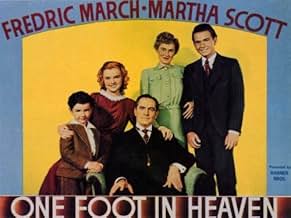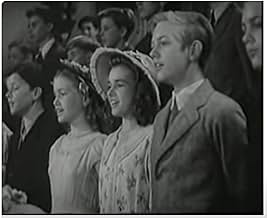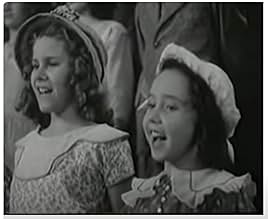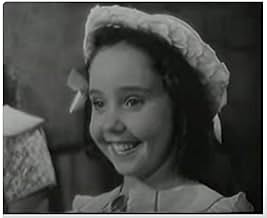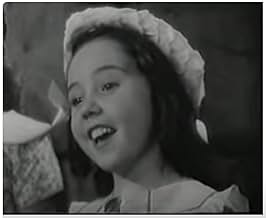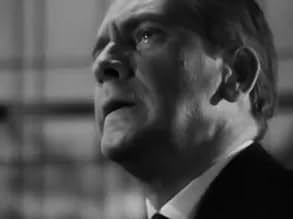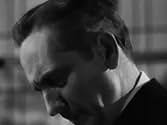CALIFICACIÓN DE IMDb
6.6/10
1.6 k
TU CALIFICACIÓN
Una mirada episódica a la vida de un ministro y su familia cuando se mudan de una parroquia a otra.Una mirada episódica a la vida de un ministro y su familia cuando se mudan de una parroquia a otra.Una mirada episódica a la vida de un ministro y su familia cuando se mudan de una parroquia a otra.
- Dirección
- Guionistas
- Elenco
- Nominado a 1 premio Óscar
- 2 premios ganados y 1 nominación en total
Dorothy Adams
- Woman Behind Hope at Baptism
- (sin créditos)
Joan Anderson
- Child
- (sin créditos)
- Dirección
- Guionistas
- Todo el elenco y el equipo
- Producción, taquilla y más en IMDbPro
Opiniones destacadas
This enduring classic is one of those films you can start at 12 midnight and watch all the way through without dozing off for a second. There are no dazzling special effects, no edge-of-your seat car chases or mid-air rescues.However,its engaging procession of honest scenes depicting the often overwhelming, though eventually rewarding, trials of a man of God during the first half of the twentieth century rival the greatest of superficial,high-tech thrills today's blockbusters have to offer. From the early scenes of Mrs.Spence trying valiantly to adjust to the squalor of her parsonages to Dr.Spence's creative solution to the adult choir's intolerable dissonance this film is a radiant beacon in a bleak world bereft with terrorism, wars, and rumors of wars due to its straightforward, heartfelt depiction of faith under fire. Though obviously filled with references to Methodist doctrine the film does not alienate members of other denominations and even nonbelievers can see this as an excellent example of how old-fashioned values triumph over hypocrisy and ignorance in turbulent times. Unfortunately, this movie is unbelievably rare and only pops up on TCM once in a blue moon. I
For those who are cynical about the religious life, here's a movie which ought to put some of that cynicism to rest. "One Foot in Heaven" is the true story of a Methodist preacher and his family, and it rings true, not just for the humanity Frederic March brings to his role as the preacher, but for the situations and characters that many of us, regardless of creed, will easily relate to. My dad used to say, A church is its people. I think One Foot in Heaven is a perfect illustration of this truth. Though this is a story about a preacher, we aren't preached at. There's a wonderful scene, with the preacher gently urging his agnostic doctor to start coming to church. He doesn't beat him over the head with a Bible but tries a more "humanist" approach.
Someone else has compared One Foot in Heaven with It's a Wonderful Life. Another film to compare is Going My Way. In fact, One Foot in Heaven and Going My Way were released just a year apart. There are story similarities, like the building of new churches (The Bishop's Wife is another example), but it's interesting to see how religion in the community is seen respectively through Protestant and Catholic lenses.
Then, there's the final scene. In some ways it's corny, but it still moves me. It hearkens to a time when religion wasn't sectarian but seamlessly interwoven in community life, unselfconsciously and unostentatiously. It was before the battle lines between religionists and secularists were drawn, when America had a "civil" religion. Alas, a time past.
Someone else has compared One Foot in Heaven with It's a Wonderful Life. Another film to compare is Going My Way. In fact, One Foot in Heaven and Going My Way were released just a year apart. There are story similarities, like the building of new churches (The Bishop's Wife is another example), but it's interesting to see how religion in the community is seen respectively through Protestant and Catholic lenses.
Then, there's the final scene. In some ways it's corny, but it still moves me. It hearkens to a time when religion wasn't sectarian but seamlessly interwoven in community life, unselfconsciously and unostentatiously. It was before the battle lines between religionists and secularists were drawn, when America had a "civil" religion. Alas, a time past.
Being a preacher's kid is never easy. I was one, and so was my wife. This movie portrays in dramatic ways the humanity and humour of being a preacher's family living essentially on hand outs and never quite having the perfect home for the kids. I can relate to Hartzel, the eldest son. Like him I wished my Dad could have been anything else but a preacher. Like Hartzel I found out in many situations just how much Dad would go through for us.
This movie is nostalgic in many ways. It hearkens back to a time when values like vision, and sacrifice were highly esteemed, and were going the extra mile was not an option but an expected way of life. Sometimes, when I look back, I rewind this video and watch it.
It is a human story, wrapped up in the faith of a man and his family, who laid hold of a dream to make God real in every facet of life, and to show people that God cares about all of us. It is a story of trial and adversity and perseverance and triumph. In the end it is not the glory and accolades of man that matter, but of having lived a life well lived and full to brim.
The cast of this film is perfect and very believable. Some of the characters I have known personally in different churches my father pastored. It is as if they are in every congregation. The issues of never owning a home or being able to decorate as you please, or not having enough groceries, and even the leaky roof over our heads, all resonate. I have lived through them myself. These things really happened to the circuit preachers and those who went and started new churches. These things still happen.
It is a good script, and is not in conflict with the book. The book is well worth the read as well. I have both the movie and the book. It sits amongst my most prized possessions.
You will find yourself laughing, you will shake your head in disbelief, you will get ticked off, but in the end you will find yourself appreciating and loving this very human family that attempts to keep loving and keep living out what they believe, to love God and to love your neighbour as yourself.
This movie will reveal just how much and how full a life can be, and how meaningful it is to serve others. Gayle Sayers the Hall of Fame running back of the Chicago Bears said, "God first, others second, myself third." This is exactly what this movie is about. Getting the priorities right and living life to the full.
This movie is nostalgic in many ways. It hearkens back to a time when values like vision, and sacrifice were highly esteemed, and were going the extra mile was not an option but an expected way of life. Sometimes, when I look back, I rewind this video and watch it.
It is a human story, wrapped up in the faith of a man and his family, who laid hold of a dream to make God real in every facet of life, and to show people that God cares about all of us. It is a story of trial and adversity and perseverance and triumph. In the end it is not the glory and accolades of man that matter, but of having lived a life well lived and full to brim.
The cast of this film is perfect and very believable. Some of the characters I have known personally in different churches my father pastored. It is as if they are in every congregation. The issues of never owning a home or being able to decorate as you please, or not having enough groceries, and even the leaky roof over our heads, all resonate. I have lived through them myself. These things really happened to the circuit preachers and those who went and started new churches. These things still happen.
It is a good script, and is not in conflict with the book. The book is well worth the read as well. I have both the movie and the book. It sits amongst my most prized possessions.
You will find yourself laughing, you will shake your head in disbelief, you will get ticked off, but in the end you will find yourself appreciating and loving this very human family that attempts to keep loving and keep living out what they believe, to love God and to love your neighbour as yourself.
This movie will reveal just how much and how full a life can be, and how meaningful it is to serve others. Gayle Sayers the Hall of Fame running back of the Chicago Bears said, "God first, others second, myself third." This is exactly what this movie is about. Getting the priorities right and living life to the full.
In a class I was taking we were assigned to watch this movie, and then, on paper, keep track of the conflicts that were found. I couldn't stop writing. It was one conflict after another.
I have just been moved to a new church, and though my problems were no where near what the pastor in the movie had to face, I learned a lot from it and I decided to share it with others.
We showed the movie at a Sunday Night service and it was well received and I recommend showing it to your churches. It generated a lot of laughter, especially the differences from then to today, but it also made many good points that hit home. I noticed a change in their attitudes the next day.
I have just been moved to a new church, and though my problems were no where near what the pastor in the movie had to face, I learned a lot from it and I decided to share it with others.
We showed the movie at a Sunday Night service and it was well received and I recommend showing it to your churches. It generated a lot of laughter, especially the differences from then to today, but it also made many good points that hit home. I noticed a change in their attitudes the next day.
"One Foot in Heaven" is quite simply one of the most beautiful films that I have encountered. A mainstream film of this sort would NEVER even be considered today; it seems even a bit tame for 1940.
And yet, the world was vastly different then, and the gentle,loving tone of this film reflects a sort of "old-time" morality that seems hopelessly lost today.
This was a major Warner Brothers release and, with Hal Wallis as producer, one expects and gets a very high quality film which lovingly recreates scenes from the life of an ordinary Methodist minister during the first 40 years of the 20th century. No earth-shaking events here--just the day-to-day trials and tribulations, the simple joys and heartaches, the small-town politics and frustrations that reveal humanity in all of its imperfections.
I am amazed that Frederic March is sometimes regarded as a dull actor; he was the epitome of subtle, honest realism, and he carries the narrative of this film in an amazing way, tender, gracious, humorous, a bit stodgy--but always willing to "bend" when necessary, resourceful, loving, and above all, very human.
The movie is filled with an array of Hollywood's best character actors, and the extremely detailed sets, costumes, etc really serve as a "window" to another time and place in our American past.
Max Steiner's extremely pious score is almost a bit much at times, but it nonetheless adds a reverent strength to the proceedings.
And then, there is the final scene, one of the most moving and unique in any film that I know. Once again, the ultimate destination of the plot is nothing earth-shaking---but the concept and staging of the last scene is really remarkable. A simple, old-time street on a gorgeous spring day, the townspeople who have come to know and love their minister all stopping their work and joining the procession through the street as they follow the sounds of the carillon from the new church. Martha Scott, Frankie Thomas, Gene Lockhart, Beulah Bondi, Harry Davenport, Laura Hope Crews--many of whom have locked horns with Mr. March during the course of the film, now join together in the dappled sunlit street, finally arriving at the church where they all lift their voices together in the moving hymn "The Church's One Foundation"... as we see Mr. March himself seated at the carillon, struggling to continue playing it through the tears streaming down his face....
I think Turner Classics has a print of this film (I saw and taped it off of Chicago's PBS station some years ago). Try to see it; like the world it represents, this beautiful film may also disappear forever.
And yet, the world was vastly different then, and the gentle,loving tone of this film reflects a sort of "old-time" morality that seems hopelessly lost today.
This was a major Warner Brothers release and, with Hal Wallis as producer, one expects and gets a very high quality film which lovingly recreates scenes from the life of an ordinary Methodist minister during the first 40 years of the 20th century. No earth-shaking events here--just the day-to-day trials and tribulations, the simple joys and heartaches, the small-town politics and frustrations that reveal humanity in all of its imperfections.
I am amazed that Frederic March is sometimes regarded as a dull actor; he was the epitome of subtle, honest realism, and he carries the narrative of this film in an amazing way, tender, gracious, humorous, a bit stodgy--but always willing to "bend" when necessary, resourceful, loving, and above all, very human.
The movie is filled with an array of Hollywood's best character actors, and the extremely detailed sets, costumes, etc really serve as a "window" to another time and place in our American past.
Max Steiner's extremely pious score is almost a bit much at times, but it nonetheless adds a reverent strength to the proceedings.
And then, there is the final scene, one of the most moving and unique in any film that I know. Once again, the ultimate destination of the plot is nothing earth-shaking---but the concept and staging of the last scene is really remarkable. A simple, old-time street on a gorgeous spring day, the townspeople who have come to know and love their minister all stopping their work and joining the procession through the street as they follow the sounds of the carillon from the new church. Martha Scott, Frankie Thomas, Gene Lockhart, Beulah Bondi, Harry Davenport, Laura Hope Crews--many of whom have locked horns with Mr. March during the course of the film, now join together in the dappled sunlit street, finally arriving at the church where they all lift their voices together in the moving hymn "The Church's One Foundation"... as we see Mr. March himself seated at the carillon, struggling to continue playing it through the tears streaming down his face....
I think Turner Classics has a print of this film (I saw and taped it off of Chicago's PBS station some years ago). Try to see it; like the world it represents, this beautiful film may also disappear forever.
¿Sabías que…?
- TriviaWilliam S. Hart was the guest of honor at the Hollywood premiere of this movie, since his movie The Silent Man (1917) figures prominently in the plot.
- ErroresAt the beginning of the movie, William Spence (Fredric March) announces he has been "called" to the church and will become a pastor in the Methodist Church. His soon-to-be mother-in-law, Mrs. Norris (Nana Bryant)), replies that she would have preferred that he'd joined the Episcopal Church. At that time, in Canada, the dominant church was the Church of England, not the Episcopal Church. That is predominantly a US institution born out of the American Revolution.
- Citas
William Spence: [to his son, Hartzell] A pastor's family are in a special category. We are uh... Well, It's as if we walked a sort of tightrope. Balancing with one foot on earth and one foot already in heaven.
- ConexionesEdited into Happy Times and Jolly Moments (1943)
- Bandas sonorasThe Children's Prayer
(uncredited)
from "Hansel and Gretel"
Music by Engelbert Humperdinck
Libretto by Adelheid Wette
Sung by the Robert Mitchell Choir
Selecciones populares
Inicia sesión para calificar y agrega a la lista de videos para obtener recomendaciones personalizadas
Detalles
- Tiempo de ejecución1 hora 48 minutos
- Color
- Relación de aspecto
- 1.37 : 1
Contribuir a esta página
Sugiere una edición o agrega el contenido que falta

Principales brechas de datos
By what name was Con un pie en el cielo (1941) officially released in India in English?
Responda

